GENERAL P. G. T. BEAUREGARD CONFEDERATE CSA PSA/DNA Civil War BOLD AUTOGRAPH RARE
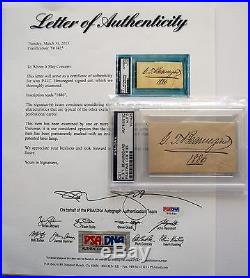
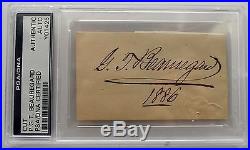
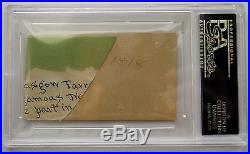
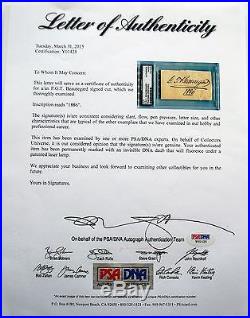
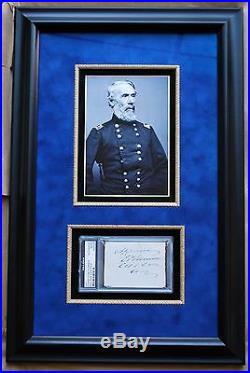
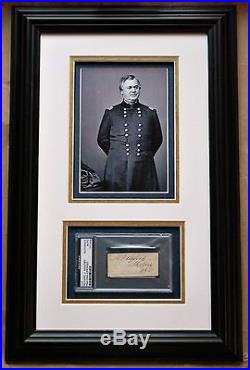

BEAUREGARD CONFEDERATE CSA PSA/DNA Civil War BOLD AUTOGRAPH RARE DATED 1886! PSA LOA SIGNED BY STEVE GRAD FROM PAWN STARS. Only sell authenticated or pre-certified items as there are too many people up to bad ideas! These look good framed as I have several. It shows off the true authenticity. Last two pictures are EXAMPLES.
HISTORY MUST ALWAYS BE PRESERVED SO WE CAN LEARN FROM IT. From Wikipedia, the free encyclopedia.
Tomb of the Army of Tennessee, Metairie Cemetery. First Battle of Bull Run. First Battle of Charleston Harbor. First Battle of Fort Wagner. Second Battle of Fort Wagner. Second Battle of Charleston Harbor. Second Battle of Fort Sumter. Author, civil servant, politician, inventor. Beauregard (born Pierre Gustave Toutant-Beauregard ; May 28, 1818 February 20, 1893) was a American military officer, politician, inventor, writer, civil servant, and the first prominent general of the Confederate States Army.During the American Civil War. Today, he is commonly referred to as P. Beauregard, but he rarely used his first name as an adult. He signed correspondence as G. Trained as a civil engineer.
At the United States Military Academy. Beauregard served with distinction as an engineer in the MexicanAmerican War. Following a brief appointment as superintendent at West Point in 1861, after the South seceded he resigned from the United States Army. And became the first brigadier general. In the Confederate States Army.He commanded the defenses of Charleston, South Carolina. At the start of the Civil War at Fort Sumter.
Three months later he won the First Battle of Bull Run. Beauregard commanded armies in the Western Theater. Including at the Battle of Shiloh. And the Siege of Corinth. His greatest achievement was saving the important industrial city of Petersburg, Virginia. In June 1864, and thus the nearby Confederate capital of Richmond. From assaults by overwhelmingly superior Union Army. His influence over Confederate strategy was lessened by his poor professional relationships with President. And other senior generals and officials. In April 1865, Beauregard and his commander, General Joseph E. Convinced Davis and the remaining cabinet members that the war needed to end. Johnston surrendered most of the remaining armies of the Confederacy, including Beauregard and his men, to Major General. Executive, and became wealthy as a promoter of the Louisiana Lottery.First Bull Run (First Manassas). Beauregard as a young man, painting by Richard Clague. Beauregard was born at the "Contreras" sugar-cane plantation.
About 20 miles (32 km) outside New Orleans. Beauregard was the third child of Hélène Judith de Reggio, of mixed French. Ancestry and descendant of Francesco M. Whose family had migrated to France.
And her husband, Jacques Toutant-Beauregard, of French. He had three brothers and three sisters. Beauregard attended New Orleans private schools and then went to a "French school" in New York City. During his four years in New York, beginning at age 12, he learned to speak English, as French had been his first language in Louisiana. He then attended the United States Military Academy. At West Point, New York. One of his instructors was Robert Anderson.Who later became the commander of Fort Sumter. And surrendered to Beauregard at the start of the Civil War. Upon enrolling at West Point, Beauregard dropped the hyphen from his surname and treated Toutant as a middle name, to fit in with his classmates. From that point on, he rarely used his first name, preferring G.
He graduated second in his class in 1838 and excelled both as an artilleryman. His Army friends gave him many nicknames: "Little Creole", "Bory", "Little Frenchman", "Felix", and Little Napoleon. The 1861 George Peter Alexander Healy.
Portrait of Beauregard in the National Portrait Gallery. Beauregard served as an engineer under General Winfield Scott. For the battles of Contreras. Where he was wounded in the shoulder and thigh.
He was noted for his eloquent performance in a meeting with Scott in which he convinced the assembled general officers to change their plan for attacking the fortress of Chapultepec. He was one of the first officers to enter Mexico City. Beauregard considered his contributions in dangerous reconnaissance missions and devising strategy for his superiors to be more significant than those of his engineer colleague, Captain Robert E.
So he was disappointed when Lee and other officers received more brevets than he did. For the next 12 years, he was in charge of what the Engineer Department called the Mississippi and Lake defenses in Louisiana. Much of his engineering work was done elsewhere, repairing old forts and building new ones on the Florida. Coast and in Mobile, Alabama.He also improved the defenses of Forts St. On the Mississippi River below New Orleans. He created and patented an invention he called a "self-acting bar excavator" to be used by ships in crossing bars of sand and clay. While serving in the Army, he actively campaigned for the election of Franklin Pierce. The Democratic presidential candidate in 1852.
And a former general in the Mexican War who had been impressed by Beauregard's performance at Mexico City. Pierce appointed Beauregard as superintending engineer of the U. In New Orleans, a huge granite building that had been built in 1848. As it was sinking unevenly in the moist soil of Louisiana, Beauregard had to develop a renovation program. He served in this position from 1853 to 1860 and stabilized the structure successfully.
During his service in New Orleans, Beauregard became dissatisfied as a peacetime officer. Army Engineer Department late in 1856 that he was going to join the filibuster.Who had seized control of Nicaragua. He had offered Beauregard the rank of second-in-command of his army. Senior officers, including general-in-chief Winfield Scott, convinced Beauregard to stay in the United States. He briefly entered politics as a reform candidate for mayor of New Orleans.
In 1858, where he was promoted by both the Whig. Parties to challenge the Know Nothing. Employing the political influence of his brother-in-law, John Slidell. Beauregard obtained an appointment as superintendent. Military Academy on January 23, 1861. His orders were revoked and he relinquished the office after only five days when Louisiana. He protested to the War Department that they had cast "improper reflection upon [his] reputation or position in the Corps of Engineers" by forcing him out as a Southern officer before any hostilities began. Marie Antoinette Laure Villeré, Beauregard's first wife and the mother of his three children.In 1841, Beauregard married Marie Antoinette Laure Villeré (March 22, 1823 March 21, 1850). The daughter of Jules Villeré, a sugar cane planter in Plaquemines Parish. And a member of one of the most prominent French Creole.
Marie's paternal grandfather was Jacques Villeré. The second governor of Louisiana. She was described as having blue eyes and fair skin.The couple had three children: René (18431910), Henri (18451915), and Laure (18501884). Marie died in March 1850, while giving birth to Laure. Ten years later, the widower Beauregard married Marguerite Caroline Deslonde, the daughter of André Deslonde, a sugar cane. Caroline was a sister-in-law of John Slidell.
And later a Confederate diplomat. She died in New Orleans in March 1864, when it was under Union. They had no children together.
On first meeting, most people were struck by [Beauregard's] "foreign" appearance. His skin was smooth and olive-complexioned. His eyes, half-lidded, were dark, with a trace of Gallic melancholy about them. His hair was black (though by 1860 he maintained this hue with dye). He was strikingly handsome and enjoyed the attentions of women, but probably not excessively or illicitly. He sported a dark mustache and goatee, and he rather resembled Napoleon III. Then ruler of Francealthough he often saw himself in the mold of the more celebrated Napoleon Bonaparte. Beauregard traveled by steamship from New York to New Orleans and immediately began giving military advice to the local authorities, which included further strengthening Forts St. Philip and Jackson, which guarded the Mississippi approaches to New Orleans. He hoped to be named commander of the state army, but was disappointed that the state legislature appointed Braxton Bragg.Aware that Beauregard might resent him, Bragg offered him the rank of colonel. Instead Beauregard enrolled as a private in the "Orleans Guards", a battalion of French Creole aristocrats. At the same time, he communicated with Slidell and the newly chosen President Davis, angling for a senior position in the new Confederate States Army. Rumors that Beauregard would be placed in charge of the entire Army infuriated Bragg. Concerned about the political situation regarding the Federal presence at Fort Sumter in Charleston Harbor, Davis selected Beauregard to take command of Charleston's defenses.
Beauregard seemed the perfect combination of military engineer and charismatic Southern leader needed at that time and place. Beauregard became the first Confederate general officer. In the Provisional Army of the Confederate States on March 1, 1861. On July 21, he was promoted to full general.In the Confederate Army, one of only seven appointed to that rank; his date of rank made him the fifth most senior general, behind Samuel Cooper. Bombardment of Fort Sumter , 1861.
Arriving in Charleston on March 3, 1861, Beauregard met with Governor Francis Wilkinson Pickens. And inspected the defenses of the harbor, which he found to be in disarray. He was said to display a great deal in the way of zeal and energy...
But little professional knowledge and experience. Major Robert Anderson at Fort Sumter wrote to Washington, D. That Beauregard, who had been his student at West Point in 1837. Would guarantee that South Carolina's actions be exercised with skill and sound judgment. Beauregard wrote to the first Confederate capital of Montgomery, Alabama.
That Anderson was a "most gallant officer". Beauregard did not relish firing on his old friend and former instructor. By early April, political tensions were mounting and Beauregard demanded that Sumter surrender before a planned Union expedition to re-provision the fort could arrive.Early on the morning of April 12, negotiations with Anderson had failed and aides of Beauregard, sent to deal personally with Anderson, ordered the first shots of the American Civil War to be fired from nearby Fort Johnson. The bombardment of Fort Sumter. Subjected to thousands of rounds fired from batteries ringing the harbor, Anderson surrendered Fort Sumter on April 14. Described the extravagant praise from throughout the Confederacy that "The Hero of Fort Sumter" received for his victory: He was the South's first paladin. Start of the First Battle of Bull Run.
Summoned to the new Confederate capital of Richmond, Virginia, Beauregard received a hero's welcome at the railroad stations along the route. He was given command of the "Alexandria Line". Of defenses against an impending Federal offensive that was being organized by Brig.
(one of Beauregard's West Point classmates) against the Confederate railroad junction at Manassas. Beauregard devised strategies to concentrate the forces of (full) General Joseph E. Johnston from the Shenandoah Valley. With his own, aiming not only to defend his position, but to initiate an offensive against McDowell and Washington.
Despite his seniority in rank, Johnston lacked familiarity with the terrain and ceded tactical planning of the impending battle to Beauregard as a professional courtesy. President Davis considered many of Beauregard's plans to be impractical for an army as inexperienced as the Confederates could field in 1861; throughout the war, Davis and Beauregard would argue about Beauregard's tendencies to devise grand strategies based on formal military principles. Davis believed he lacked a pragmatic grasp of logistics, intelligence, relative military strengths, and politics.The First Battle of Bull Run. (First Manassas) began early on July 21, 1861, with an element of surprise for both armies both McDowell and Beauregard planned to envelop their opponent with an attack from their right flank. McDowell struck first, crossing Bull Run. And threatening Beauregard's left flank.
For a while, Beauregard persisted in moving his troops for an attack on his right flank McDowell's left, toward Centreville. , but Johnston urged him to travel with him to the threatened flank at Henry House Hill. Seeing the strength of the Union attack at that point, Beauregard insisted that Johnston leave the area of immediate action and coordinate the overall battle from a position 1.5 miles (2.4 km) to the rear. Beauregard rallied the troops, riding among the men, brandishing regimental colors, and giving inspirational speeches.
As Johnston's final troops arrived from the Shenandoah Valley, the Confederates launched a counterattack that routed the Union Army, sending it streaming in disorder back toward Washington. Credits Johnston with the majority of the tactical decisions that led to the victory, judging that Beauregard acted chiefly as a dime novel general, leading the charge of an individual regiment, riding along the line to cheer the troops, accepting the huzzas of the soldiers and complementing them in turn. The closest he came to a major tactical decision was his fleeting intention to withdraw from the Henry Hill line when he briefly mistook the advance of Johnston's reinforcements for the arrival of fresh Union troops.Nonetheless, Beauregard received the bulk of the acclaim from the press and general public. On July 23, Johnston recommended to President Davis that Beauregard be promoted to full general.
Davis approved, and Beauregard's date of rank was established as the date of his victory, July 21. The official design of the Confederate Battle flag. Confederate soldier in front of official Confederate battle flag. After Bull Run, Beauregard advocated the use of a standardized battle flag other than the "Stars and Bars".Confederate national flag to avoid visual confusion with the U. He worked with Johnston and William Porcher Miles.
To create the Confederate Battle Flag. Confederate women visiting Beauregard's army contributed silk material from their dresses to create the first three flags, for Beauregard, Johnston, and Earl Van Dorn. Thus, the first flags contained more feminine pink than martial red. However, the official battle flag had a red background with white stars.
Throughout his career, Beauregard worked to have the flag adopted, and he helped to make it the most popular symbol of the Confederacy. As the Army went into winter quarters, Beauregard caused considerable friction with the Confederate high command. He strongly advocated an invasion of Maryland. To threaten the flank and rear of Washington.
With his plan rebuffed as impractical, he requested reassignment to New Orleans, which he assumed would be under Union attack in the near future, but his request was denied. He quarreled with Commissary General Lucius B. (a personal friend of Davis) about the inadequate supplies available to his army. He issued public statements challenging the ability of the Confederate Secretary of War. To give commands to a full general. And he enraged President Davis when his report about Bull Run was printed in the newspaper, which suggested that Davis's interference with Beauregard's plans prevented the pursuit and full destruction of McDowell's army and the capture of Washington. Map of the Battle of Shiloh, afternoon of April 6, 1862, after Beauregard took command. Having become a political liability in Virginia, Beauregard was transferred to Tennessee. To become second-in-command to General Albert Sidney Johnston. No relation to Joseph E. Johnston in his Army of Mississippi. The two generals planned the concentration of Confederate forces to oppose the advance of Maj. Before he could combine his army with that of Maj.In a thrust up the Tennessee River. The march from Corinth was plagued by bad weather, which delayed the army's arrival by several days, and during that time, several contacts were made with Union scouts. Because of this, Beauregard felt the element of surprise had been lost and recommended calling off the attack, but Johnston decided to proceed with the plan. In the Battle of Shiloh.
Which began April 6, 1862, the Confederates launched a surprise attack against Grant's Army of the Tennessee. Which despite days of prior reports of Confederate troop movements, were completely unaware that the entire Army of Mississippi was coming right at them. Once again a more senior general named Johnston deferred to the junior Beauregard in planning the attack.
The massive frontal assault was marred by Beauregard's improper organization of forcessuccessive attacks by corps in lines 3 miles (4.8 km) long, rather than assigning each corps a discrete portion of the line for a side-by-side assault. This arrangement caused intermingling of units and confusion of command; it failed to concentrate mass at the appropriate place on the line to affect the overall objectives of the attack.
In midafternoon, Johnston, who was near the front of the battle action, was mortally wounded. Beauregard, positioned in the rear of the army to send reinforcements forward, assumed command of the army and Johnston's overall Western department (officially designated "Department Number Two"). As darkness fell, he chose to call off the attack against Grant's final defensive line, which had contracted into a tight semicircle backed up to the Tennessee River at Pittsburg Landing. Beauregard's decision was one of the most controversial of the Civil War. Numerous veterans and historians have wondered what might have happened if the assault had gone forward into the night.Beauregard believed that the battle was essentially won and his men could finish off Grant in the morning. He knew the terrain to be crossed (a steep ravine containing a creek named Dill Branch) was extremely difficult and Grant's defensive line was heavy with massed artillery and supported by gunboats in the river. Unbeknownst to Beauregard, Buell's Army of the Ohio. Began arriving that afternoon, and he and Grant launched a massive counterattack on April 7. Overwhelmed, the Confederates retreated to Corinth.
Grant was temporarily disgraced by the surprise attack and near defeat, causing his superior, Maj. To assume field command of the combined armies. Halleck cautiously and slowly approached Beauregard's fortifications at Corinth; his action became derisively called the Siege of Corinth.
Beauregard withdrew from Corinth on May 29 to Tupelo, Mississippi. He was able to deceive Halleck into thinking the Confederates were about to attack; he ran empty trains back and forth through the town while whistles blew and troops cheered as if massive reinforcements were arriving. Beauregard retreated because of the overwhelming Union force and because of contaminated water supplies in Corinth. In April and May, the Confederates lost almost as many men to death by disease in Corinth as had been killed in battle at Shiloh.
Nevertheless, his leaving the critical rail junction at Corinth without a fight was another controversial decision. When Beauregard went on medical leave without requesting permission in advance, President Davis relieved him of command and replaced him with Gen. At Beauregard's request, his allies in the Confederate Congress petitioned Davis to restore his command in the West. Davis remained angry at Beauregard's absence and told him he should have stayed at his post even if he had to be carried around in a litter. He wrote, If the whole world were to ask me to restore General Beauregard to the command which I have already given to General Bragg, I would refuse it. Beauregard was ordered to Charleston and took command of coastal defenses in South Carolina, Georgia. The latter was promoted to lieutenant general and transferred to command the defenses of Vicksburg, Mississippi. Beauregard was unhappy with his new assignment, believing that he deserved command of one of the great Confederate field armies.He performed successfully, however, preventing the capture of Charleston by Union naval and land attacks in 1863. On April 7, 1863, Rear Admiral. Commander of the South Atlantic Blockading Squadron.
Attack against Fort Sumter that was repulsed by highly accurate artillery fire from Beauregard's forces. In July through September 1863, union land forces under Brig. Launched a series of attacks on Fort Wagner.
And other fortifications at the mouth of the harbor, while Rear Adm. Attempted to destroy Fort Sumter. Because the latter operation failed, the successful seizure of Morris Island was not effective in threatening Charleston. During this period, Beauregard promoted innovative naval defense strategies, such as early experimentation with submarines. (called "torpedoes" in the Civil War), and with a small vessel called a torpedo-ram.A swift boat fitted with a torpedo on a pole projecting from its bow under water, it could be used to surprise an enemy vessel and impale it underneath the water line. He was also busy devising strategies for other generals in the Confederacy. He proposed that some of the state governors meet with Union governors of the Western states what are called the Midwest. States today for a peace conference. The Davis administration rejected the idea, but it caused considerable political maneuvering by Davis's enemies in the Congress.
Beauregard also proposed a grand strategy. Submitted anonymously through his political allies so that it was not tainted by his reputationto reinforce the Western armies at the expense of Robert E. Lee's army in Virginia, destroy the Federal army in Tennessee, which would induce Ulysses S. Grant to relieve pressure on Vicksburg and maneuver his army into a place where it could be destroyed. The Confederate Army would continue to Ohio, and induce the Western states to ally with the Confederacy. Meanwhile, a fleet of torpedo-rams built in England could be used to recapture New Orleans, ending the war. There is no record that his plan was ever officially presented to the government. While visiting his forces in Florida, which had just repelled a Union advance at Jacksonville. Beauregard received a telegram that his wife had died on March 2, 1864.Living in Union-occupied New Orleans, she had been seriously ill for two years. A Northern-leaning local newspaper printed an opinion that her condition had been exacerbated by the actions of her husband. This so fanned negative popular opinion that 6,000 people attended her funeral.
Provided a steamer to carry her body upriver for burial in her native parish. Beauregard wrote that he would like to rescue "her hallowed grave" at the head of an army.
In April 1864, Beauregard saw little opportunity for military glory because he foresaw that there would be no more significant assaults against Charleston, and prospects for a major field command were unlikely. He requested a leave to recover from fatigue and a chronic throat ailment, but he instead received an order to report to Weldon, North Carolina. Near the Virginia border, to play a key role in the defense of Virginia. His new assignment, the Department of North Carolina and Cape Fear, also included Virginia south of the James River. When he took command on April 18, he renamed it, on his own initiative, the Department of North Carolina and Southern Virginia. The Confederates were preparing for the spring offensive of Union Lt.And were concerned that attacks south of Richmond could interrupt the critical supply lines to Richmond and the army of Robert E. Nothing illustrates better the fundamental weakness of the Confederate command system than the weary series of telegrams exchanged in May and early June between Davis, Bragg, Beauregard, and Lee. Beauregard evaded his responsibility for determining what help he could give Lee; Davis and Bragg shirked their responsibility to decide, when he refused.
The strangest feature of the whole affair was that, in the face of Lee's repeated requests, nobody in the high command thought to order Beauregard to join Lee. Harry Williams, Napoleon in Gray.
As Grant moved south against Lee in the Overland Campaign. Launched the surprise Bermuda Hundred Campaign. With landings up the James River.Beauregard successfully lobbied with Jefferson Davis's military adviser, Braxton Bragg, to prevent significant units of his small force from being transferred north of Richmond to the aid of Lee. His timely action, coupled with the military incompetence of Butler, bottled up the Union army, nullifying its threat to Petersburg and Lee's supply line. Now that this sector was stable, pressure began to rise to transfer troops from Beauregard's front to Lee's. Beauregard did send a division Maj.
S to Lee for the Battle of Cold Harbor. But Lee urgently wanted more and took the step of offering Beauregard command of the right wing of the Army of Northern Virginia. Beauregard replied in a passiveaggressive. Beauregard's defense of Petersburg, Federal assaults of June 1518.
After Cold Harbor, Lee and the Confederate high command were unable to anticipate Grant's next move, but Beauregard's strategic sense allowed him to make a prophetic prediction: Grant would cross the James River and attempt to seize Petersburg, which was lightly defended, but contained critical rail junctions supporting Richmond and Lee. Despite persistent pleas to reinforce this sector, Beauregard could not convince his colleagues of the danger.On June 15, his weak 5,400-man forceincluding boys, old men, and patients from military hospitalsresisted an assault by 16,000 Federals, known as the Second Battle of Petersburg. He gambled by withdrawing his Bermuda Hundred defenses to reinforce the city, assuming correctly that Butler would not capitalize on the opening. His gamble succeeded, and he held Petersburg long enough for Lee's army to arrive.
It was arguably his finest combat performance of the war. Beauregard continued commanding the defenses of Petersburg in the early days of the siege. But with the loss of the Weldon Railroad in the Battle of Globe Tavern.
(August 1821), he was criticized for not attacking more forcefully and he became dissatisfied with the command arrangements under Lee. He hoped for an independent command, but his desires were thwarted in two instances: Lee chose Lt. To lead an expedition north through the Shenandoah Valley and threaten Washington, and Davis chose Lt. To replace the faltering Joseph E.Johnston in the Atlanta Campaign. After the fall of Atlanta in September 1864, President Davis considered replacing John Bell Hood. In command of the Army of Tennessee.
And he asked Robert E. To find out if Beauregard would be interested. Beauregard was indeed interested, but it is unclear whether Davis seriously considered the appointment, and in the end decided to retain Hood. Davis met with Beauregard in Augusta, Georgia. On October 2 and offered him command of the newly created Department of the West, responsible for the five Southern states from Georgia to the Mississippi River, with the armies of Hood and Richard Taylor.However, it was a thankless job that was limited to logistical and advisory responsibilities, without true operational control of the armies unless he should join them in person during an emergency. Nevertheless, anxious to return to the field, he accepted the assignment. The major field operation of the fall was Hood's Franklin-Nashville Campaign. An invasion of Tennessee, which he undertook despite Beauregard's counsel that it made little operational or logistical sense. Hood did not treat Beauregard with the respect due to the department commander, communicating his plans reluctantly and making movements without regard to the consequences for his supply line, which Beauregard scrambled to maintain.
While Hood traveled through Alabama and into Tennessee, Union Maj. Began his March to the Sea. Which focused Beauregard's attention back to Georgia. He was ineffective in stopping, or even delaying, Sherman's advance.He had inadequate local forces and was reluctant to strip defenses from other locations to concentrate them against Sherman. Furthermore, Sherman did an excellent job of deceiving the Confederates as to the intermediate and final targets of his march. Savannah fell on December 21 and Sherman's army began to march north into South Carolina in January. Also in late December, Beauregard found out that Hood's army had been severely damaged in its defeat at the Battle of Nashville. There were very few men in fighting condition who could oppose Sherman's advance.
Beauregard attempted to concentrate his small forces before Sherman could reach Columbia, South Carolina, the state capital. His urgent dispatches to Richmond were treated with disbeliefDavis and Robert E. Lee (now the general in chief of all the Confederate armies) could not believe that Sherman was advancing without a supply line as quickly as Beauregard was observing him do. Also concerned about what he considered Beauregard's "feeble health, " Lee recommended to Davis that he be replaced by Joseph E. The change of command came on February 22 and Beauregard, although outwardly cooperative and courteous to Johnston, was bitterly disappointed at his replacement.For the remainder of the war, Beauregard was Johnston's subordinate, assigned to routine matters without combat responsibilities. Johnston and Beauregard met with President Davis on April 13 and their assessment of the Confederate situation helped convince Davis that Johnston should meet with Sherman to negotiate a surrender of his army.
The two surrendered to Sherman near Durham, North Carolina. On April 26, 1865, and were paroled in Greensboro. Beauregard traveled to Mobile and then took a U.Naval transport to his hometown of New Orleans. In August that year Beauregard's house was surrounded by troops who suspected he was harbouring Edmund Kirby Smith.
All the inhabitants were locked in a cotton press overnight. Beauregard complained to General Philip Sheridan. Who expressed his annoyance at his erstwhile enemy's treatment. After the war, Beauregard was reluctant to seek amnesty as a former Confederate officer by publicly swearing an oath of loyalty, but both Lee and Johnston counseled him to do so, which he did before the mayor of New Orleans on September 16, 1865.
He was one of many Confederate officers issued a mass pardon by President Andrew Johnson. His final privilege as an American citizen, the right to run for public office, was restored when he petitioned the Congress for relief and the bill on his behalf was signed by President Grant on July 24, 1876. Beauregard pursued a position in the Brazilian Army. In 1865, but declined the Brazilians' offer. He claimed that the positive attitude of President Johnson toward the South swayed his decision.
I prefer to live here, poor and forgotten, than to be endowed with honor and riches in a foreign country. He also declined offers to take command of the armies of Romania. Beauregard worked to end Republican. His outrage over the perceived excesses of Reconstruction was a principal source for his indecision about remaining in the United States and his flirtation with foreign armies, which lasted until 1875. He was active in the Reform Party, an association of conservative New Orleans businessmen, which spoke in favor of civil rights.
And voting for former slaves. Hoping to form alliances between African-Americans and Democrats to vote out the Radical Republicans in the state legislature. Beauregard's first employment following the war was in October 1865 as chief engineer and general superintendent of the New Orleans, Jackson and Great Northern. In 1866 he was promoted to president, a position he retained until 1870, when he was ousted in a hostile takeover. This job overlapped with that of president of the New Orleans and Carrollton Street Railway. (18661876), where he invented a system of cable-powered street railway cars. Once again, Beauregard made a financial success of the company, but was fired by stockholders who wished to take direct management of the company. In 1869 he demonstrated a cable car. After the loss of these two railway executive positions, Beauregard spent time briefly at a variety of companies and civil engineering pursuits, but his personal wealth became assured when he was recruited as a supervisor of the Louisiana Lottery in 1877. He and former Confederate general Jubal Early presided over lottery drawings and made numerous public appearances, lending the effort some respectability. For 15 years the two generals served in these positions, but the public became opposed to government-sponsored gambling and the lottery was closed down by the legislature. Beauregard's military writings include Principles and Maxims of the Art of War (1863), Report on the Defense of Charleston , and A Commentary on the Campaign and Battle of Manassas (1891). He was the uncredited co-author of his friend Alfred Roman's The Military Operations of General Beauregard in the War Between the States (1884). He contributed the article "The Battle of Bull Run" to Century Illustrated Monthly Magazine in November 1884. During these years, Beauregard and Davis published a series of bitter accusations and counter-accusations retrospectively blaming each other for the Confederate defeat. Beauregard served as adjutant general. For the Louisiana state militia, 187988. In 1888, he was elected as commissioner of public works.And his wife died in 1879, leaving ten destitute orphans, Beauregard used his influence to get Hood's memoirs published, with all proceeds going to the children. He was appointed by the governor of Virginia to be the grand marshal of the festivities associated with the laying of the cornerstone of Robert E. Lee's statue in Richmond.
Died in 1889, Beauregard refused the honor of heading the funeral procession, saying We have always been enemies. Beauregard died in his sleep in New Orleans. The cause of death was heart disease, aortic insufficiency, and probably myocarditis. The last surviving full general of the Confederacy, served as the "chief mourner" as Beauregard was interred in the vault of the Army of Tennessee in historic Metairie Cemetery. In New Orleans by sculptor Alexander Doyle.
Beauregard's residence in New Orleans is now called the Beauregard-Keyes House. And is operated as a historic house museum. In western Louisiana is named for him, as is Camp Beauregard.
Army base and National Guard camp near Pineville. Is also named for him.
Four camps are named after Beauregard in the Sons of Confederate Veterans. In New Orleans depicted him. The monument, considered to glorify institutions which supported slavery. Was removed on May 17, 2017. Beauregard was portrayed by Donald Sutherland.
List of American Civil War generals (Confederate). Bibliography of the American Civil War. In A Dictionary of Louisiana Biography , vol. 1, edited by Glenn R.
New Orleans: Louisiana Historical Association, 1988. Backdoor to Richmond: The Bermuda Hundred Campaign, AprilJune 1864. Baton Rouge: Louisiana State University Press, 1987.
The Military Operations of General Beauregard in the War between the States, 1861 to 1865: Including a Brief Personal Sketch and a Narrative of his Services in the War with Mexico, 1846-8. New York, Da Capo Press, 1994.
First published 1884 by Harper & Brothers. The Civil War in Louisiana. Baton Rouge: Louisiana State University Press, 1963. Works by or about Gustave Toutant Beauregard.
Works by or about P. Beauregard during the American Civil War. Held in the Walter Havighurst Special Collections, Miami University.
The Citadel Archives, Beauregard, Pierre Gustave Toutant, 18181893. Superintendents of the United States Military Academy. BEAUREGARD CONFEDERATE CSA PSA/DNA Civil War BOLD AUTOGRAPH RARE" is in sale since Friday, September 01, 2017. This item is in the category "Collectibles\Autographs\Historical". The seller is "civil_war_and_more" and is located in Eagle, Idaho. This item can be shipped to United States, Canada, United Kingdom, Denmark, Romania, Slovakia, Bulgaria, Czech republic, Finland, Hungary, Latvia, Lithuania, Malta, Estonia, Australia, Greece, Portugal, Cyprus, Slovenia, Japan, China, Sweden, South Korea, Indonesia, Taiwan, South africa, Thailand, Belgium, France, Hong Kong, Ireland, Netherlands, Poland, Spain, Italy, Germany, Austria, Russian federation, Israel, Mexico, New Zealand, Philippines, Singapore, Switzerland, Norway, Saudi arabia, Ukraine, United arab emirates, Qatar, Kuwait, Bahrain, Croatia, Malaysia, Brazil, Chile, Colombia, Costa rica, Panama, Trinidad and tobago, Guatemala, Honduras, Jamaica, Antigua and barbuda, Aruba, Belize, Dominica, Grenada, Saint kitts and nevis, Saint lucia, Montserrat, Turks and caicos islands, Barbados, Bangladesh, Bermuda, Brunei darussalam, Bolivia, Ecuador, Egypt, French guiana, Guernsey, Gibraltar, Guadeloupe, Iceland, Jersey, Jordan, Cambodia, Cayman islands, Liechtenstein, Sri lanka, Luxembourg, Monaco, Macao, Martinique, Maldives, Nicaragua, Oman, Peru, Pakistan, Paraguay, Reunion.- Autograph Authentication: Professional Sports (PSA//DNA)
- Signed by: P.
